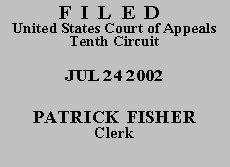

| SIREINO JOE MARTINEZ,
Plaintiff - Appellant, v. RIECKE CLAUSSEN, individually and in the official capacity as Sheriff of Mesa County; STEVE FARLOW, individually and in his official capacity; JOHN ABEYTA, individually and in his official capacity, Defendants - Appellees. |
|
Plaintiff filed a civil rights action under 42 U.S.C. § 1983 alleging various constitutional violations based on his detention, as a pretrial detainee, at the Mesa County, Colorado, Detention Facility from June of 1997 to December of 1999. Plaintiff claimed he was subjected to "unlawful punishment" in violation of the due process and equal protection clauses of the Fourteenth Amendment. He further alleged that the detention facility failed to follow the American Correctional Association's standards in its classification system and that the facility was overcrowded, resulting in excessive lock-in or lock-down times. He challenged the prison's color-coded classification system as inadequately reflecting either the charges on which he was being tried or his propensity for violence. He further contended he was denied the right to privileges and programs depending on his housing classification. He also claimed he was held in maximum security confinement for over ten months and that his segregation status was inadequately reviewed.
The magistrate judge determined that under the holding of Bell v. Wolfish, 441 U.S. 520 (1979), plaintiff's constitutional rights as a pretrial detainee had not been violated and recommended granting summary judgment to defendants. The district court considered plaintiff's objections and adopted the magistrate judge's recommendation. We have jurisdiction over the appeal, and we affirm.
On appeal plaintiff states that his one claim is that he was "unconstitutionally punished." He recites the number of days he spent in maximum security confinement for disciplinary reasons and argues that there are no records to explain the balance of time he spent there.
Our standard of review of the district court's order granting summary judgment is de novo. Diaz v. Paul J. Kennedy Law Firm, 289 F.3d 671, 674 (10th Cir. 2002) Summary judgment is appropriate "if the pleadings, depositions, answers to interrogatories, and admissions on file, together with the affidavits, if any, show that there is no genuine issue as to any material fact and that the moving party is entitled to a judgment as a matter of law." Fed. R. Civ. P. 56(c).
The district court correctly determined that plaintiff's claims are governed by Bell, which holds that absent an intent to punish, a particular condition or restriction of pretrial detention does not constitute punishment if reasonably related to a legitimate governmental objective. See Bell, 441 U.S. at 538-39. Plaintiff did not claim that defendants intended to punish him by placing him in maximum security segregation, nor did he allege that the conditions of maximum segregation were per se unconstitutional. Based on our review of the record and plaintiff's arguments, we conclude he has failed to demonstrate a violation of his constitutional rights.
Accordingly, we AFFIRM the district court for substantially the reasons stated by the magistrate and district judges in their respective orders of July 11 and September 12, 2001.
Entered for the Court
Circuit Judge
*. This order and judgment is not binding precedent, except under the doctrines of law of the case, res judicata, and collateral estoppel. The court generally disfavors the citation of orders and judgments; nevertheless, an order and judgment may be cited under the terms and conditions of 10th Cir. R. 36.3.